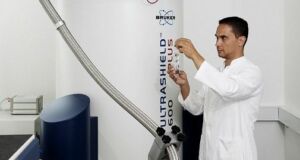News
Danish researches could be closing in on improved breast cancer prediction
This article is more than 10 years old.
New method could revolutionise diagnostics and treatment

New model could predict whether a woman would develop breast cancer within 2-5 years (photo: Københavns Universitet)
Researchers from the University of Copenhagen (KU) have created a mathematical model that can predict breast cancer two to five years earlier than today.
The model, which the researchers currently evaluate as a prototype, could possibly be used in the future to predict illness in general and has the potential to revolutionise the method of diagnosing and treating a number of illnesses.
“We are talking about a method that is better than a mammogram, which can only be used when the illness has occurred,” Rasmus Bro, a professor specialising in chemotherapy at the Department of Food Science at KU, said.
“The method isn’t perfect, but it’s really good. Meanwhile, it’s also a method which, in theory, will be able to be transferred to other cancer illnesses and completely different illness groups. To be able to predict an illness before they happen makes the method a sort of oracle.”
READ MORE: Significant increase in child cancer survival rates
80 percent success rate
While a mammogram can reveal existing breast cancer with a 75 percent success rate, the new model could – using a newly-developed blood profile – predict whether a woman would develop breast cancer within two to five years with an 80 percent success rate.
The model – developed by the Department of Food Science and the Department of Nutrition, Exercise and Sports at KU in co-operation with cancer advocates Kræftens Bekæmpelse – provides a blood ‘fingerprint’ that can reveal if that person will develop breast cancer.
Bro underlined, however, that the model had only been tested on one group of participants from a single population cohort study, and that it needs to be tested more broadly before it can be utilised.
The research has been published in the scientific journal Metabolomics (here in English).










































